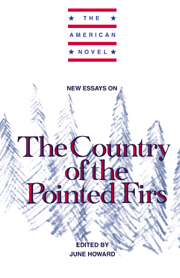Book contents
- Frontmatter
- Contents
- Series Editor's Preface
- 1 Introduction: Sarah Orne Jewett and the Traffic in Words
- 2 Country's Portrayal of Community and the Exclusion of Difference
- 3 Gender and American Realism in The Country of the Pointed Firs
- 4 Material Culture, Empire, and Jewett's Country of the Pointed Firs
- 5 Regionalism and Nationalism in Jewett's Country of the Pointed Firs
- Notes on Contributors
- Selected Bibliography
5 - Regionalism and Nationalism in Jewett's Country of the Pointed Firs
Published online by Cambridge University Press: 08 January 2010
- Frontmatter
- Contents
- Series Editor's Preface
- 1 Introduction: Sarah Orne Jewett and the Traffic in Words
- 2 Country's Portrayal of Community and the Exclusion of Difference
- 3 Gender and American Realism in The Country of the Pointed Firs
- 4 Material Culture, Empire, and Jewett's Country of the Pointed Firs
- 5 Regionalism and Nationalism in Jewett's Country of the Pointed Firs
- Notes on Contributors
- Selected Bibliography
Summary
IN most American literary histories, the late-nineteenth-century turn in fiction toward region is assumed to signal a rejection of nation and national issues. Regionalism is envisioned as a limited form, just as “local color” is seen, sometimes pejoratively, more recently affirmatively, as a minor literature associated with local places, “little” forms, and women. Regions as various as Jewett's New England, the pre–Civil War South of George Washington Cable, Thomas Dixon, and others, and the quasi-mythic, Roman or medieval settings of popular historical romances are treated as though they inhabit Jackson Lears's “no place of grace.” That is, such constructed regions are thought of as symptomatic of the flight from modernism and the sense of placelessness that Lears sees as endemic to turn-of-the-century U.S. culture. If not exactly party to Lears's “antimodernist impulse,” these constructions are grouped together under the banner of nostalgia, as backward glances at supposedly simpler, more cohesive ways of life characteristic of pre–Civil War America.
As a critical lens, regionalism thus implicitly “Americanizes” these regions, turning Ben Hur's Rome and Jewett's Dunnet Landing alike into embodiments of a prelapsarian, Utopian “America.” Regionalism homogenizes its imagined regions even as it excludes historical change as an active participant in the production of regional writing. The only “history” generally associated with regionalists is static, containing categories of literary history or such set pieces of monumental history as the decline of rural life under industrialism.
- Type
- Chapter
- Information
- New Essays on The Country of the Pointed Firs , pp. 101 - 118Publisher: Cambridge University PressPrint publication year: 1994
- 6
- Cited by



